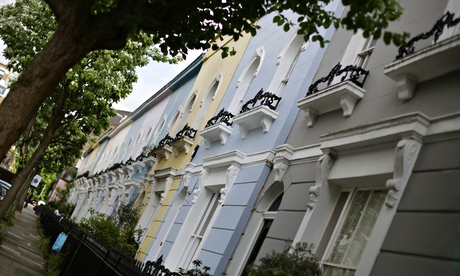London house price boom halted amid fears of interest rate rise
08-17-2014
Growth forecast cut to 3% for 2015 from 15% this year as estate agents report steep fall in new buyers and viewings of properties

Hilary Osborne
The Guardian
A street in Kentish Town, London. One agent said 'value went out of the window' with sealed bids and homes fetching over the asking price. Photograph: Yui Mok/PA
The scramble for homes in London that helped push up prices in some areas by more than a third in 12 months has come to a juddering halt, according to estate agents around the capital.
Buyers who had become accustomed to queueing for viewings before the outbreak of bidding wars have more recently seen asking prices falling as tighter mortgage lending, fears of an imminent interest rate rise and an increase in the number of homes for sale have put a brake on a market that many feared was turning into a bubble.
This week, the Royal Institution of Chartered Surveyors and the estate agency chain Haart reported that the heat was starting to abate in the London market, with a fall in sales in July and the sharpest drop in new buyers since the onset of the financial crisis.
The upmarket property company Hamptons International halved its growth forecast for Greater London next year to 3% after the 15% predicted for this year, saying the pace of growth had started to slacken.
Estate agents around the capital have reported the market cooling in recent weeks, pinpointing as the turning point June's warning from the Bank of England governor, Mark Carney, that interest rates could rise before the end of the year.
"Prices were rising really, really fast. People were paying well over the asking price and then all of a sudden we saw things stop – it was like a handbrake had been pulled up," said Charlie Perdios, managing director of agents Anthony Pepe in Haringey, north London, where prices rose by 22% in the year to June. "We were doing open days and getting 60 viewings on a property over a weekend, then suddenly it dropped to 15."
Steve Hatch, director and valuer at Castles, another north London agent, said the Bank's warning "got the attention it was meant to get and made people think for a moment. We noticed that things got quieter; the craziness came out of the market." Previously, he said, each property attracted 20 to 30 buyers and bids came in above the asking price but "now [they were] agreeing the asking price or just below".
Perdios said the uncertainty put off buyers for a while and convinced potential sellers that the top of the market had arrived, meaning more stock entered the market and prices started to ease. "Before, you were almost speculating as to what people would pay … now we're exercising more caution with our valuations and asking prices have dropped slightly."
In Kennington, south London, where the property website Zoopla puts the average asking price at £772,437, Tom Floyd, sales manager at the estate agents Winkworth, said the introduction of affordability checks on borrowers in April had made a difference.
"I would say that May was probably the top of the market," said Floyd. "People probably realised that the market was topping out and started to put their homes up for sale – in January I had eight properties on my books; I've now got 60. In June alone we took on 34."
He said that in the first half of the year "value went out of the window" – every day a couple of properties went to sale by sealed bids and homes fetched an average of 104% of the asking price.
"Now you've got to pick the phone up rather than getting calls before you get the chance. It's gone back to normal to be honest," Floyd said.
The frenzy of the London property market was symbolised by open house events, where in some cases buyers queued around the block to take a whistlestop tour of a property on the market for hundreds of thousands of pounds. Agents said the drop in the number of buyers chasing each home meant that these were becoming a less familiar sight. Perdios said: "We are slowly, slowly coming off open houses. I think they will soon be a thing of the past."
Other experts said the rapid rise in prices meant that some buyers would not, or could not, enter the market. "In well over 30 years I've seen this countless times, when competing agents force asking prices so high that buyers just say no thanks," said Ed Mead, director of Douglas & Gordon. "There always follows a three-month hiatus while sellers and buyers stand off. We're in the third month and sellers appear to be blinking as the fall off in asking prices shows."
Matthew Pointon, a property economist at Capital Economics, said buyers were becoming overstretched, with the ratio of house prices to earnings significantly higher than its previous peak. Pointon said the shift in the supply and demand balance would "lead to a rapid deceleration in house price inflation in the capital".
He added: "A strong economic backdrop, and the fact that buyers are likely to come back once the choice of properties on the market improves, will lead to further, although much more modest, price gains next year. But with prices already at a very high level, we expect other regions will at least match London next year, and are likely to overtake the capital in 2016."
Russell Quirk from the online estate agent eMoov.co.uk suggested that the slowdown in the capital could be good news elsewhere. "There is still plenty of demand within London, but a cooling period could see a benefit to the whole nation as this could mean we avoid a hike to interest rates."

